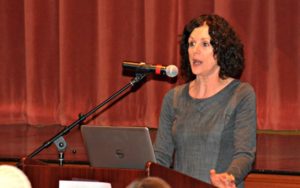The simmering racial unrest that has flowed across America in recent months has led to an extremely discomfited white populace, striking out with angry or guilty defensiveness in response to pointed fingers that many white people believe unfairly paint them all as racists—or at least as the recipients of white privilege.
“I do atypical work for a white person, which is that I lead primarily white audiences in discussions on race every day, in workshops all over the country,” DiAngelo explained in an interview with the site AlterNet. “That has allowed me to observe very predictable patterns. And one of those patterns is this inability to tolerate any kind of challenge to our racial reality. We shut down or lash out or in whatever way possible block any reflection from taking place. Of course, it functions as means of resistance, but I think it’s also useful to think about it as fragility, as inability to handle the stress of conversations about race and racism. Sometimes it’s strategic, a very intentional push back and rebuttal. But a lot of the time, the person simply cannot function. They regress into an emotional state that prevents anybody from moving forward.”
“White fragility also comes from a deep sense of entitlement,” she said. “Think about it like this: from the time I opened my eyes, I have been told that as a white person, I am superior to people of color. There’s never been a space in which I have not been receiving that message. From what hospital I was allowed to be born in, to how my mother was treated by the staff, to who owned the hospital, to who cleaned the rooms and took out the garbage. We are born into a racial hierarchy, and every interaction with media and culture confirms it—our sense that, at a fundamental level, we are superior.
“And, the thing is, it feels good. Even though it contradicts our most basic principles and values. So we know it, but we can never admit it. It creates this kind of dangerous internal stew that gets enacted externally in our interactions with people of color, and is crazy-making for people of color. We have set the world up to preserve that internal sense of superiority and also resist challenges to it. All while denying that anything is going on and insisting that race is meaningless to us.”
DiAngelo’s explication of the delicacies of cross-racial interaction explains so much of the experience Black people have around the topic, the predictable reactions Black people have come to expect from white people. DiAngelo said racism creates such uncomfortable moments for white people because it goes against their basic need to feel like they are good people.
“For white people, their identities rest on the idea of racism as about good or bad people, about moral or immoral singular acts, and if we’re good, moral people we can’t be racist – we don’t engage in those acts,” she said. “This is one of the most effective adaptations of racism over time—that we can think of racism as only something that individuals either are or are not ‘doing.’ In large part, white fragility—the defensiveness, the fear of conflict—is rooted in this good/bad binary. If you call someone out, they think to themselves, ‘What you just said was that I am a bad person, and that is intolerable to me.’ It’s a deep challenge to the core of our identity as good, moral people.”
DiAngelo said that whites often will strike out at Black people when they are challenged and retreat into an old stereotype by saying they feel unsafe. She used as an example a Black man who was accused of “online harassment” by a white woman after he challenged her in a particularly pointed way.
“First of all, whites often confuse comfort with safety. We say we don’t feel safe, when what we mean is that we don’t feel comfortable,” she said. “Secondly, no white person looks at a person of color through objective eyes. There’s been a lot of research in this area. Cross-racially, we do not see with objective eyes. Now you add that he’s a black man. It’s not a fluke that she picked the word ‘harassed.’ In doing that, she’s reinforcing a really classic, racist paradigm: White women and black men. White women’s frailty and black men’s aggressiveness and danger.
“But even if she is feeling that, which she very well may be, we should be suspicious of our feelings in these interactions. There’s no such thing as pure feeling. You have a feeling because you’ve filtered the experience through a particular lens. The feeling is the outcome. It probably feels natural, but of course it’s shaped by what you believe.”
DiAngelo flipped it around and looked at this from the perspective of Black people.
“If people of color went around showing the pain they feel in every moment that they feel it, they could be killed. It is dangerous,” she said. “They cannot always share their outrage about the injustice of racism. White people can’t tolerate it. And we punish it severely—from job loss, to violence, to murder. For them to take that risk and show us, that is a moment of trust. I say, bring it on, thank you. When I’m doing a workshop, I’ll often ask the people of color in the room, somewhat facetiously, ‘How often have you given white people feedback about our inevitable and often unconscious racist patterns and had that go well for you?’ And they laugh.
“Because it just doesn’t go well. And so one time I asked, ‘What would your daily life be like if you could just simply give us feedback, have us receive it graciously, reflect on it and work to change the behavior? What would your life be like?’ And this one man of color looked at me and said, ‘It would be revolutionary.’ ”
DiAngelo said it drives her crazy that so many people think they’re experts on race and racism in America.
“I’ll run into someone I haven’t seen in 20 years in the grocery store, and they’ll say, ‘Hi! What’ve you been doing?’ And I say, ‘I got my Ph.D.’ And they say, ‘Oh wow, what in?’ ‘Race relations and white racial identity.’ And they’ll go “Oh, well you know. People just need to—’
“As if they’re going to give me the one-sentence answer to arguably the most challenging social dynamic of our time. Like, hey, why did I knock myself out for 20 years studying, researching, and challenging this within myself and others? I should have just come to you! And the answer is so simple! I’ve never heard that one before! Imagine if I was an astronomer. Everybody has a basic understanding of the sky, but they would not debate an astronomer on astronomy. The arrogance of white people faced with questions of race is unbelievable.”



